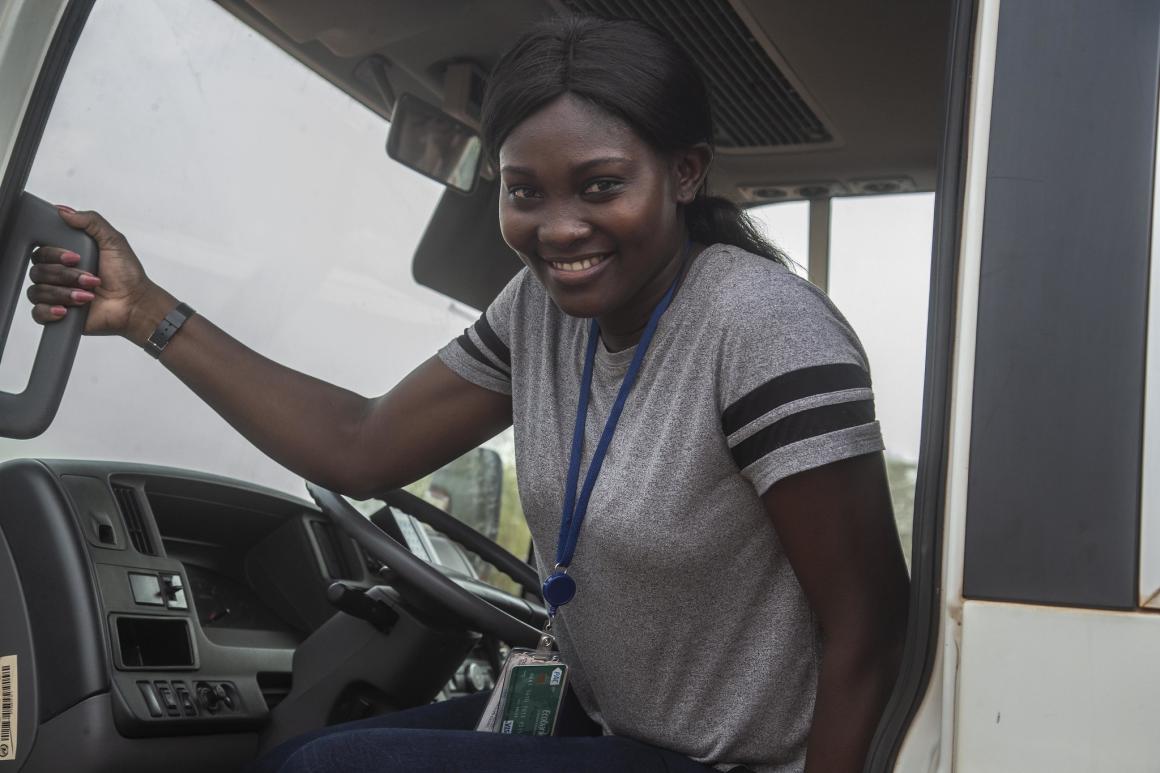International Women's Day, marked on 8 March around the world every year, recognizes women's historic struggle for the respect of their rights. In the Central African Republic (CAR), the 2021 International Women’s Day, celebrated under the theme "Investing in Peacebuilding and Gender Equality for Women's Empowerment in the Context of Covid-19", is an opportune moment to shine a light on MINUSCA’s work for the inclusion and promotion of women in peacekeeping work.
MINUSCA’s Transport Section employs seven women out of 44 UN commuter bus drivers – testimony to continuing efforts to promote gender equality. As the world marks this year’s International Women’s Day (IWD), we speak to some of these Central African women – local staff who are finding their feet in a male-dominated profession as UN drivers – trailblazers in their communities in the service of peace and security. They share stories of their professional journeys and ultimately, of empowerment.
For Yolande Mazima Yasseko, choosing to become a driver came naturally: “When I was still at home and unemployed, I asked myself what I wanted to do and what I knew how to do well. For to do a job well, you first have to love what you do and then be supported by what is around you, so I said to myself, I drive really well, so why not drive as a profession? That's when I applied for a driver position.” She passed the recruitment process.
She recounts how her supervisor’s appreciation for having her on the previously all-male work team buoyed her belief in her new-found profession; she never looked back.
Like their male counterparts, the female drivers ferry MINUSCA peacekeeping personnel between the various UN bases and their residences and across the country’s capital Bangui in commuter buses – providing an indispensable daily service for peacekeeping work. Crucially, they are part of the transport section’s team that plays a significant role in ensuring that peacekeeping staff are safely transported to and from work and around the city, in a fragile security context.
Significantly, they contribute to the day-to-day work of peacebuilding – using their skills to further the implementation of the Women, Peace and Security (WPS) mandate, that recognizes women’s participation in peace and political processes as imperative to achieving lasting peace.
“The big buses were especially difficult to maneuver when we first started to train as Mission drivers,” says another female driverLaurelle Voco Kouzoudet. For her, effort and endurance are what it’s taken to get there. “It took six months of intensive training to be able to acquire the required professional expertise,” she adds.
Success at the wheel notwithstanding, it is not always an easy ride.
According to Olivia Mouno Koisset, “what’s for certain is that there are numerous obstacles – take for example the lack of priority signs on the roads in Bangui. Moreover, many motorcycle cab drivers do not respect the priority traffic rules, so there is a potential for many accidents if you’re not careful or vigilant.”

They must also ensure that their passengers adhere to the preventive measures against the spread of Covid-19 put in place by the Central African government – social distancing, the use of hydro-alcoholic gel and the obligatory wearing of masks in the bus.
Empowered in their professional life, these young female drivers also reflect on their individual ambitions as well as women’s collective advancement as they celebrate International Women’s Day.
“In honor of this day, my goal is to encourage other women to consider joining our profession; for myself, my aim is to advance my career as a driver,” says Yolande Mazima Yasseko.
Vanessa Feizoure Komboy finds pride in knowing that her achievement is helping change attitudes on gender roles. “There are many people who doubted our capacity. Now it's their turn to be proud of us, because we didn't give up.” She reveals that a female mentor pushed them to keep going despite the many challenges they faced, including being told by many people that driving is only for men.
“When it comes to gender equality, any work performed by men can also be performed by women. There is still a long way to go, however, as many women still doubt their ability or know-how in several fields,” notesbus conductor Christelle Doyemet. “On this International Women’s Day, I want to remind them that women and men are equal; what men can do, women can also do. Before, there were only male drivers but now, there are many women who drive, so I would encourage others to follow in our footsteps”, she says,echoing the 2021 IWD theme of achieving an equal future in a COVID-19 world.
In his message for the 2021 International Women’s Day, the UN Secretary-General António Guterres said that building an equal future for men and women is “a job for everyone – and for the benefit of everyone”.
“In a male-dominated world with a male-dominated culture, gender equality is essentially a question of power.Males are an essential part of the solution,” he added, while calling on “countries, companies and institutions to adopt special measures and quotas to advance women’s equal participation and achieve rapid change.”






